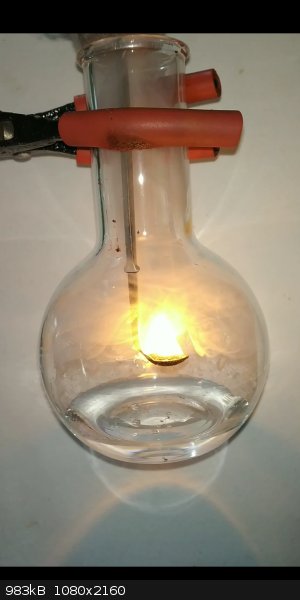vibbzlab
Hazard to Others
  
Posts: 241
Registered: 6-11-2019
Member Is Offline
Mood: Always curious
|
|
Tried to synthesise Disodium hydrogen phosphate from red phosphorus and sodium hydroxide
I tried to create Disodium hydrogen phosphate by burning red phosphorus in concentrated caustic soda solution taken in a flask and mixed up the
vapours in the solution by shaking the glassware. Would it have produced the salt ? Any ideas on thar?

Amateur chemist. Doctor by profession
Have a small cute home chemistry lab.

Please do check out my lab in YouTube link below
This is my YouTube channel |
|
|
Loptr
International Hazard
    
Posts: 1348
Registered: 20-5-2014
Location: USA
Member Is Offline
Mood: Grateful
|
|
Sounds like a waste if red phosphorus to me, but that's only because it isnt readily available where I am located.
"Question everything generally thought to be obvious." - Dieter Rams
|
|
|
vibbzlab
Hazard to Others
  
Posts: 241
Registered: 6-11-2019
Member Is Offline
Mood: Always curious
|
|
It's available here and I did it for the sake of proving theory
Amateur chemist. Doctor by profession
Have a small cute home chemistry lab.

Please do check out my lab in YouTube link below
This is my YouTube channel |
|
|
Metacelsus
International Hazard
    
Posts: 2542
Registered: 26-12-2012
Location: Boston, MA
Member Is Offline
Mood: Double, double, toil and trouble
|
|
Yes it should produce the salt (the initial product would be P2O5 which would then dissolve).
But it's about as useful as making NaCl from Na and Cl2.
|
|
|
wg48temp9
National Hazard
   
Posts: 786
Registered: 30-12-2018
Location: not so United Kingdom
Member Is Offline
|
|
White P and probably red P react with sodium hydroxide to form phosphine and sodium hypophosphite.
To clarify my comment when you burn P in a flask you tend to get some condensed phosphorus vapor on the walls of the flask and probably in the NaOH.
[Edited on 11/13/2019 by wg48temp9]
I am wg48 but not on my usual pc hence the temp handle.
Thank goodness for Fleming and the fungi.
Old codger' lives matters, wear a mask and help save them.
Be aware of demagoguery, keep your frontal lobes fully engaged.
I don't know who invented mRNA vaccines but they should get a fancy medal and I hope they made a shed load of money from it.
|
|
|
vibbzlab
Hazard to Others
  
Posts: 241
Registered: 6-11-2019
Member Is Offline
Mood: Always curious
|
|
So is there any special test to know whether I made Disodium hydrogen phosphate or not?
Amateur chemist. Doctor by profession
Have a small cute home chemistry lab.

Please do check out my lab in YouTube link below
This is my YouTube channel |
|
|
draculic acid69
International Hazard
    
Posts: 1371
Registered: 2-8-2018
Member Is Offline
|
|
Sodium hypophosphite +HCL will give hypophosphorus acid which if reacted with iodine will exothermically react to form HI whereas phosphoric acid
won't react with iodine.
[Edited on 13-11-2019 by draculic acid69]
|
|
|
vibbzlab
Hazard to Others
  
Posts: 241
Registered: 6-11-2019
Member Is Offline
Mood: Always curious
|
|
Oh ok thanks for that
Amateur chemist. Doctor by profession
Have a small cute home chemistry lab.

Please do check out my lab in YouTube link below
This is my YouTube channel |
|
|
mayko
International Hazard
    
Posts: 1218
Registered: 17-1-2013
Location: Carrboro, NC
Member Is Offline
Mood: anomalous (Euclid class)
|
|
The degree of protonation of phosphate is pH dependent; that's why it's often used in buffers. If your solution is still strongly basic, you have
trisodium phosphate (Na3PO4), not disodium hydrogen phosphate (Na2HPO4).
al-khemie is not a terrorist organization
"Chemicals, chemicals... I need chemicals!" - George Hayduke
"Wubbalubba dub-dub!" - Rick Sanchez
|
|
|
AJKOER
Radically Dubious
    
Posts: 3026
Registered: 7-5-2011
Member Is Offline
Mood: No Mood
|
|
For safety concerns, with an aqueous mix of NaOH+P, I would avoid any incidental contact with Aluminum or its alloy, or Mg or other very
electropositive metals, per Hodges comment at https://www.sciencemadness.org/whisper/viewthread.php?tid=15... , and find that you manage to also stumble into something serious. As a possible
source, see https://www.citycollegiate.com/atomichydrogen.htm . Also, commentary in Bretherick, Volume 1, page 23-24, to quote:
"A student mixed aluminium foil and drain cleaner in a soft drink bottle, which started emitting gas. Another student carried the bottle outside and
was claimed to have been overcome by the toxic fumes [1]. Most drain cleaners are alkalis, so that aluminium will dissolve to produce hydrogen. The
bleach that it is is suggested may have been present will produce no toxic fumes in alkali, and one would be surprised to find arsenic or antimony
compounds present. If the collapse was not purely hysterical, the remaining, though remote, possibility would be phosphine. The soft drink the bottle
had contained was one of the many perhaps best described as impure dilute phosphoric acid [2]. "
A related comment attributing the formation of gases like arsine and stibine from nascent hydrogen at https://pubs.acs.org/doi/pdf/10.1021/ed011p308.
Education on nascent hydrogen interaction is important so as to avoid toxic gases that may be inadvertently and unexpectedly create in significant
amounts.
---------------------------------------------------
Having a significant oxygen presence at a temperature over 25 C may be interesting, but I would still avoid (see https://chemiday.com/en/reaction/3-1-0-807 ) owing to a fire/explosion hazard per page 1,665 in Bretherick.
A good experiment to perform is likely described here: https://chemiday.com/en/reaction/3-1-0-9380 .
[Edited on 22-11-2019 by AJKOER]
|
|
|